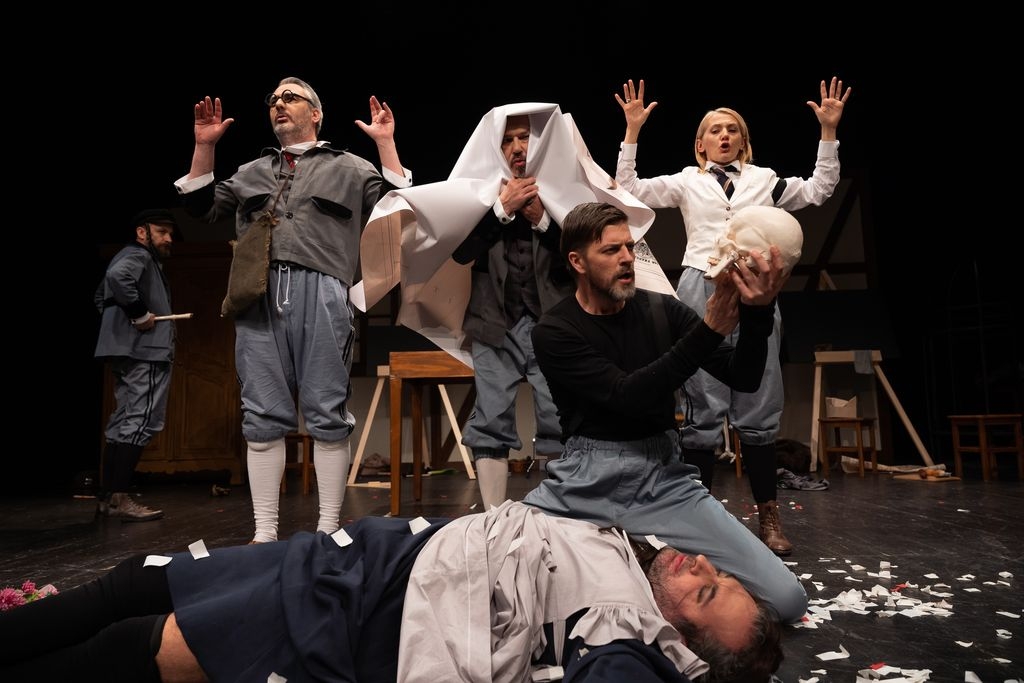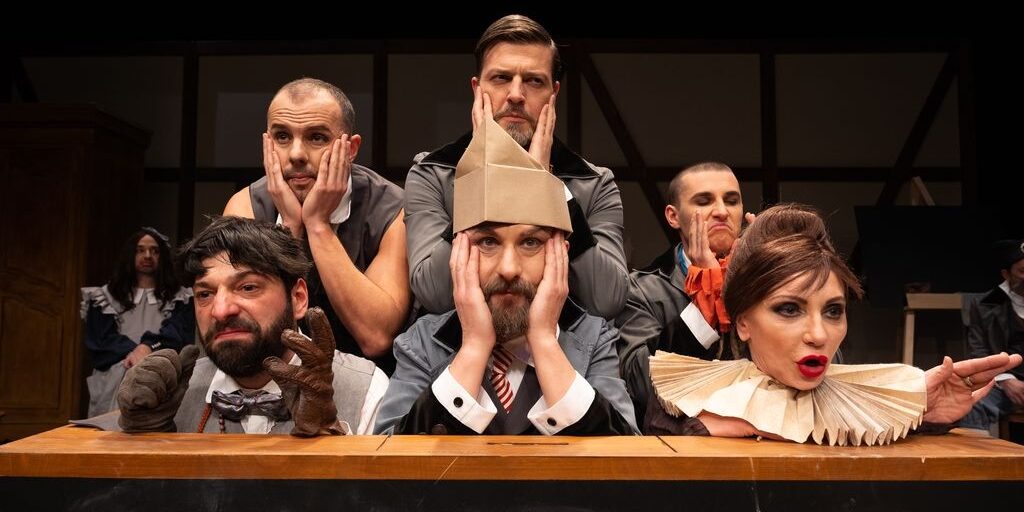Gavella Theatre/Kerempuh Theatre, Zagreb, premiere 28th February 2023
In 1896, Alfred Jarry’s Ubu Roi heralded a new era in art, playwriting and theatre. It opened the door to many directions of the avantgarde with its “obscenity” and “bizarreness,” which is how it was described at the time; now – ironically – it is part of the western canon. A once-revolutionary text that was meant to usurp the status quo has become a part of our theatrical literacy.
Inevitably, to stage it today is to pose the question: how to treat Ubu Roi not as a classic but as an instrument of provocation – especially in a time where it seems nothing can surprise us anymore – or everything is a surprise and a theme of discussion, as the creative team seem to suggest?
This new adaptation of Ubu Roi, co-produced by the Zagreb’s Gavella Drama Theatre (which has been homeless for three years now due to the Zagreb earthquake of 2020) and Kerempuh Theater, and directed and adapted by Miran Kurspahić and his regular dramaturgical collaborator Rona Žulj, is framed as a show-within-in-a-show. Set in a school for the “specially aware”, the Gavella/Kerempuh Ubu Roi is a grand Shakespearean mousetrap with even the playwright, Jarry, becoming a student of the school (here played, interestingly, by the director Kurspahić himself).
Not only does this framing correspond in part to the historical background of the play’s origin – the young Jarry intended to ridicule one of his teachers in the portrait of Ubu (in Gavella/Kerempuh version the questionable teacher played is by Borko Perić with an appetite for young flesh, who literally gains the role of Ubu) – it also successfully answers the challenge of how to approach a work that it was once unimaginable to teach to children (or in any way promote publicly) but has now become part of our curriculum.
Naturally, the new generation educated at this imaginary progressive high school has a vision of how we should approach Ubu Roi today, and which values should be integrated into it. That Jarry parodied some of Shakespeare’s legendary plays about kings and courts is already common knowledge, and an interreference which doesn’t really preoccupy the students – the problem for them lies in a completely different layer of language.
Very quickly, after the roles are divided in the classroom with the school’s principal becoming Mother Ubu (Nela Kocsis) in “supportiveness” of the student’s creative project, the class teacher being King Ubu and the rest of the class fight over the remaining roles, the central theme of the production becomes clear. The transgender Conchita (Enes Vejzović) is upset about the gender of the role that was assigned to her and the whole class is reminded that these kinds of insensitivities are not permitted in their school’s environment. The class readily apologizes, as there is no greater evil in this world than disrespect of other people’s feelings. Yet, certain pillars of power still stand tall and the role of the vengeful and de-throned prince, here named Gluposlav (Amir Bukvić), is attributed to the principal’s dear son (not to mention the fact that the principal and teacher are still queens and kings).
Kurspahić and Žulj use the mosaic of Ubu Roi to break it further apart, using its theatricality to comment on the new power structures which are at play in contemporary society. One of the schoolgirls, Mademoiselle Vertu (Iskra Jirsak) even takes on the role of the mysterious dramaturg (what does a dramaturg do, really?) when she is denied an acting role, to support this “policing” of the piece that the school is preparing. If we don’t see it ourselves, she will warn us of what and which type of disrespect is happening towards the traumatized and exploited here.
A very modern-spirited irony therefore unravels: while Ubu Roi was at the time attack at the elite and bourgeoisie society, today it becomes a tool for the minorities to overcompensate for the lack of power and the invisibility they have suffered up until now. They enter a perverse contest over whose victim status is superior, and demonstrate how we, in our fight for identity rights and historical corrections, easily fall into the same violent cycles of the oppressors (an example in our zeitgeist being “cancel culture”). Moreover, the politically incorrect aspects – the use of blackface on Josip Brakus so we don’t miss the fact that he plays Mbape Nganou or the long prop penis that can be seen at one point underneath Conchita’s skirt – are pushed, without apology, in our face to see how deep our hypocrisies go: what is the right amount of correct or incorrect?

Kralj Ubu
The creative team in some moments make the audience truly uncomfortable (though this depends to a degree on personal triggers) to pose a very sensitive question: who draws the lines of what it is permissible to say or not to say, do or show? And can a simple apology or the bending of language, change years of injustice? Is it a sign of revolutionary change? Are those signifiers of a more tolerant society? Is the complete denial of our features or an overexposure of them, a path to a more colorful and egalitarian political and cultural field?
After all, when Mbape Nganou shows signs of an air-borne viral sickness, he is all too readily put in a cage by his “sensitive” colleagues to protect themselves. Moreover, it is easy to laugh and nod your head when the words “father” and “mother” Ubu are replaced by “non-birthing parent” and “gestational parent” and see the irony of “correctness”, but what about the heavily stereotyped Mbape character? Should we protest Kurspahić and Žulj for choosing to use blackface in this day and age or are we falling in the same trap to which they are dedicating their whole adaptation – that we are focusing on representations more than on the substance of our complex political everyday (which is still an overall non-apologetic abuse of the weak by the powerful, just like in the original Ubu)?
Kurspahić, stepping in Jarry’s shoes to guide us through the meta layers, exposes his directing persona. Introducing the concept of pataphysics, constructed by Jarry himself to name the “science of imaginary solutions”, he culminates this vivacious spectacle on Kerempuh’s stage: art is there to be unapologetic (and if you don’t like it, maybe you have a problem to detect). Choosing the angle of “political correctness”, Kurspahić and Žulj found a contemporary vessel for the adaptation that allowed them not to approach Ubu Roi as some revered classic, but to continue to experiment with imaginary solutions. That they profoundly understand their material is also visible in the inventive staging (that is also highly referential like the rest of the adaptation): invoking the traditions of French puppet-theatre and mime, playing the scene of Ubu’s massacre as a massacre of different vegetables while the many blood spills and battles within the play are resolved by suffocating the stage with confetti.
This Ubu Roi can be fairly described as a bombastic experience on a visual, symbolical and rhythmic level and a title that will certainly divide audiences (especially the ones that frequent this two theatre houses). Moreover and more interestingly, it’s a spectacle that could even push the buttons of the very “progressive” audience, who ate more than aware of what Kurspahić and Žulj managed to cram into their show (and they did cram in a lot: from gender, race, ethnicity, religion, sexuality, war veterans and every conceivable tricky theme from West Europe through East Europe and down to Congo that the local audience can recognize more or less). In the end, isn’t a wonderful burlesque melting pot of everything that makes us uneasy in our chairs and in our skins exactly what Ubu Roi is supposed to be?
Credits:
Director: Miran Kurspahić//Translator: Mislava Hudoletnjaka //Adaptation: Miran Kurspahić and Rona Žulj//Dramaturg: Rona Žulj//Scenography// Matija Blašković// Costume: Danica Dedijer
For tickets and further information, visit: Kazalistekerempuh.hr or gavella.hr
Further reading: review of Ibi the Great – Andraš Urban directs Ubu Roi








